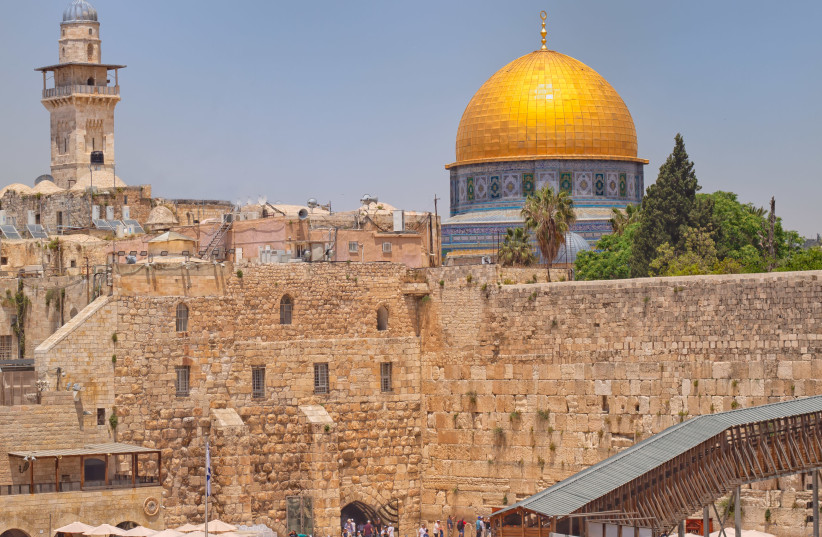The new year has just begun, but the issue of the Temple Mount (and the rising tensions because of it) looks the same.
For thousands of years, the Temple Mount has been a point of contention in the region. It is considered the holiest site in Judaism and the third most sacred in Islam. Palestinian leadership and media networks have depicted the Temple Mount dispute as the microcosm of this entire conflict (although it’s not).
On January 3, National Security Minister Itamar Ben-Gvir visited the Temple Mount for under 15 minutes, causing another media uproar. His visit was condemned by the Palestinian Authority, leaders of Qatar, Jordan, UAE, Saudi Arabia, Turkey, Oman and Lebanon, and Iran and its terrorist proxy in Gaza, Hamas. The Arab leaders called Ben-Gvir’s brief visit an “invasion,” while the Biden administration and the French government also issued condemnations.
Ben-Gvir is one of the most controversial people in Israeli politics today, known for his far-right, hardline stances on policies and his history of racism. He is highly unpopular among Israelis who lean to the Center or the Left.
As national security minister, Ben-Gvir’s responsibility is to stabilize the region and diffuse tensions. Instead, he chose to do the one thing he knew would aggravate Palestinian terrorists.

Two things can be true at once: Ben-Gvir and his ideologies and actions can be detested. At the same time, denying Jews access to the Mount or justifying violence against them for visiting and praying in their holiest site is deplorable.
Same old story on Temple Mount
This isn’t a new story; we’ve seen it played out many times before, and it always results in violence and death. The most notable instance was prime minister Ariel Sharon’s visit in 2000. Western nations viewed it as a form of provocation.
Though he was planning the uprising well in advance, Yasser Arafat used Sharon’s visit as an excuse to launch the Second Intifada (a series of vicious terrorist sprees against Israeli civilians). Whatever your thoughts are toward Sharon or Ben-Gvir (whom I can’t stand), Palestinians seem to view any Jewish presence at the Temple Mount as a form of provocation.
For a long time, Palestinian leaders and extremist figures have been using the idea that Israel “violates the status quo” on the Temple Mount to normalize violence against Jews. Groups like Hamas always capitalize on Temple Mount escalations to incite violence among Palestinians toward Jews and to expand their influence in Jerusalem and the West Bank.
What does the “status quo” actually mean? Since the 1967 war, the Wakf Islamic religious trust, instituted by Jordan after Israel’s War of Independence, has managed the Temple Mount’s religious and civil affairs, while the Israel Police is in charge of security. Muslims can enter the site through multiple gates, while Jews and tourists can enter only through a single entrance at specific times. Jews are prohibited from praying at the Temple Mount (although some quiet prayers occur).
Any Jewish person caught openly praying will be escorted out or possibly face arrest. While some organized Jewish groups have advocated for further Jewish control of the site, the Israeli authorities have never implemented that. Israel has not limited Muslim worshipers from praying at the Temple Mount, except during escalations that entail security concerns.
Whatever your opinion is on Ben-Gvir, two things should be made abundantly clear. 1) Jews, like all other people in this world, have a right to access their holy sites; and 2) no other country besides Israel would tolerate the endless retaliation from extremists.
Let us also not forget the escalations and issues at the Temple Mount. There have been several instances of Palestinians playing soccer, throwing stones and vandalizing the area. It seems some Palestinians have no problem desecrating their holy site if it harms Jews.
Yet the Biden administration felt it was its responsibility to speak out against Israel at the United Nations Security Council debate. All because an elected official visited the Temple Mount?
The presence of Jewish people visiting their holiest site should not be considered a provocation. Instead, the international community should condemn the fact that Palestinian leaders will use this to incite violence against Jews, as they have done so many times before. In the past, Arabic social media have been flooded with posts calling on Palestinians to go on stabbing sprees against Jews. The visuals go as far as to give clear instructions on how and where to stab Jewish people. All of this is in the name of saving the Temple Mount?
However critical you are of Israeli policies, or however much you don’t like Ben-Gvir, Jewish presence on the Temple Mount isn’t the problem; the violence from the other side is.
When the Ottomans controlled the region, the empire prohibited non-Muslims from setting foot on the Temple Mount until the early 19th century. Under Jordanian rule, Jews were denied access to their holy sites for 19 years until they reclaimed the Old City and Temple Mount in 1967. Under the current status quo, non-Muslims and tourists can access the site.
Jewish people (including unpopular characters like Ben-Gvir) should be allowed to visit the Temple Mount without condemnation and the fear of violence. What entitles the international community to criticize Israel for this? Why does Palestinian violence get a free pass?
The writer is a social media activist with over 10 years of experience working for Israeli, Jewish and cause-based NGOs. She is the co-founder and COO of Social Lite Creative, a digital marketing firm specializing in geopolitics.
